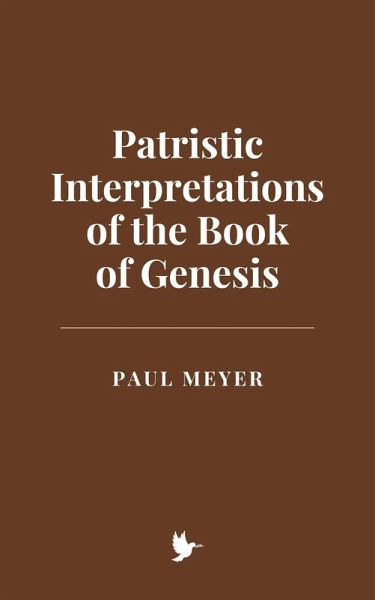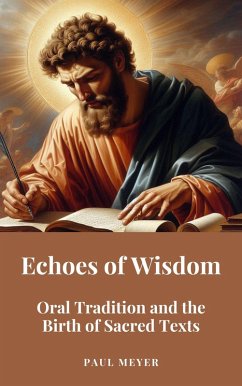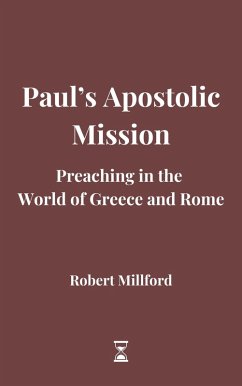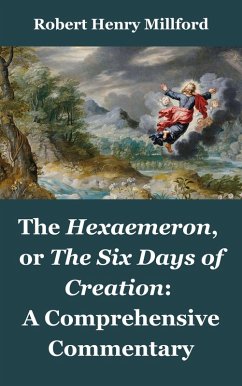
Patristic Interpretations of the Book of Genesis (eBook, ePUB)

PAYBACK Punkte
0 °P sammeln!
This book examines the Patristic interpretations of the Book of Genesis, focusing on how early Church Fathers analyzed, interpreted, and applied its narratives within their theological frameworks. Genesis, as the foundational text of Scripture, held immense importance for the Fathers, providing the basis for their reflections on creation, human nature, sin, salvation, and God's providence.The study delves deeply into key narratives such as the creation accounts, the Fall, the flood, the Tower of Babel, the lives of the patriarchs, and the establishment of the twelve tribes of Israel. The Fathe...
This book examines the Patristic interpretations of the Book of Genesis, focusing on how early Church Fathers analyzed, interpreted, and applied its narratives within their theological frameworks. Genesis, as the foundational text of Scripture, held immense importance for the Fathers, providing the basis for their reflections on creation, human nature, sin, salvation, and God's providence.
The study delves deeply into key narratives such as the creation accounts, the Fall, the flood, the Tower of Babel, the lives of the patriarchs, and the establishment of the twelve tribes of Israel. The Fathers approached these texts with a combination of literal, allegorical, typological, and moral readings, uncovering multiple layers of meaning that connected Genesis to the life and teachings of Christ, the sacraments, and the Church. Figures like Origen, Augustine, Irenaeus, John Chrysostom, and Gregory of Nyssa offered diverse perspectives, emphasizing the unity of Scripture and the continuity of God's redemptive plan.
Genesis 3:15, the Protoevangelium, serves as a cornerstone for their Christological interpretations, with the Fathers identifying in the text the first promise of salvation and the eventual victory of Christ over sin and death. Similarly, the lives of Abraham, Isaac, Jacob, and Joseph are treated as typological foreshadowings of Christ and the Church, reflecting themes of faith, obedience, suffering, and divine providence.
The Fathers also explored Genesis in relation to moral and spiritual life, emphasizing its relevance for ethical teachings and personal transformation. Themes such as the tension between free will and divine grace, the consequences of sin, the necessity of repentance, and the hope of restoration were central to their interpretations.
This study highlights how the Church Fathers used Genesis as a lens to interpret salvation history and as a source of guidance for Christian life and theology. Their exegesis not only shaped the early Church's understanding of Scripture but also continues to provide valuable insights for contemporary theological and spiritual reflection. Through their writings, Genesis is revealed as a text that transcends its historical context, offering timeless truths about God, humanity, and the cosmos.
The study delves deeply into key narratives such as the creation accounts, the Fall, the flood, the Tower of Babel, the lives of the patriarchs, and the establishment of the twelve tribes of Israel. The Fathers approached these texts with a combination of literal, allegorical, typological, and moral readings, uncovering multiple layers of meaning that connected Genesis to the life and teachings of Christ, the sacraments, and the Church. Figures like Origen, Augustine, Irenaeus, John Chrysostom, and Gregory of Nyssa offered diverse perspectives, emphasizing the unity of Scripture and the continuity of God's redemptive plan.
Genesis 3:15, the Protoevangelium, serves as a cornerstone for their Christological interpretations, with the Fathers identifying in the text the first promise of salvation and the eventual victory of Christ over sin and death. Similarly, the lives of Abraham, Isaac, Jacob, and Joseph are treated as typological foreshadowings of Christ and the Church, reflecting themes of faith, obedience, suffering, and divine providence.
The Fathers also explored Genesis in relation to moral and spiritual life, emphasizing its relevance for ethical teachings and personal transformation. Themes such as the tension between free will and divine grace, the consequences of sin, the necessity of repentance, and the hope of restoration were central to their interpretations.
This study highlights how the Church Fathers used Genesis as a lens to interpret salvation history and as a source of guidance for Christian life and theology. Their exegesis not only shaped the early Church's understanding of Scripture but also continues to provide valuable insights for contemporary theological and spiritual reflection. Through their writings, Genesis is revealed as a text that transcends its historical context, offering timeless truths about God, humanity, and the cosmos.
Dieser Download kann aus rechtlichen Gründen nur mit Rechnungsadresse in A, B, CY, CZ, D, DK, EW, E, FIN, F, GR, H, IRL, I, LT, L, LR, M, NL, PL, P, R, S, SLO, SK ausgeliefert werden.













